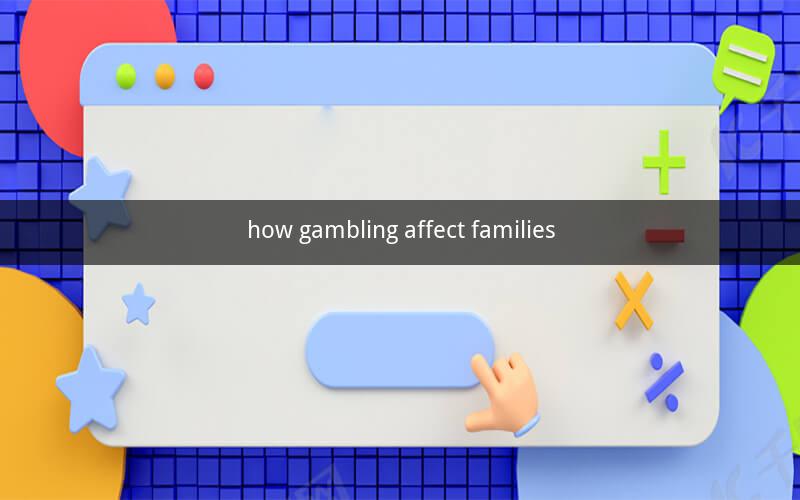
How Gambling Affects Families
Table of Contents
1. Introduction to the Impact of Gambling on Families
2. Financial Consequences
3. Emotional and Psychological Effects
4. Social and Relationships Impact
5. Children and Teenagers
6. Prevention and Support
7. Conclusion
1. Introduction to the Impact of Gambling on Families
Gambling has become an increasingly prevalent activity in modern society, with its accessibility and normalization growing rapidly. The consequences of gambling can extend far beyond the individual, profoundly affecting the lives of family members. This article delves into the various ways in which gambling can impact families, exploring the financial, emotional, psychological, social, and relational repercussions.
2. Financial Consequences
One of the most immediate and significant impacts of gambling on families is financial. When a family member becomes a problem gambler, it can lead to severe financial strain. This may include:
- Debts accumulated through gambling
- Loss of income due to the problem gambler's neglect of work
- Financial support being redirected to gambling expenses
- Diversion of funds intended for other family needs, such as housing and education
3. Emotional and Psychological Effects
The emotional and psychological toll of gambling on families is profound. Family members may experience:
- Anxiety and stress related to the gambling behavior
- Depression due to the consequences of gambling
- Feelings of guilt, shame, or inadequacy
- Confusion and uncertainty about the future
4. Social and Relationships Impact
Gambling can also disrupt the social fabric of a family. Relationships may be strained due to:
- Disagreements over financial matters
- Changes in behavior that affect family dynamics
- Loss of trust and intimacy
- Social isolation resulting from the problem gambler's behavior
5. Children and Teenagers
Children and teenagers are particularly vulnerable to the effects of gambling. They may experience:
- Emotional distress as a result of witnessing the impact of gambling on their family
- Behavioral issues as a coping mechanism
- Academic difficulties due to the stress and distraction caused by family problems
- The potential for developing their own gambling problems
6. Prevention and Support
To mitigate the negative effects of gambling on families, several strategies can be employed:
- Education about the risks of gambling
- Encouraging responsible gambling practices
- Providing support for problem gamblers and their families
- Developing policies and resources to address gambling addiction
- Promoting mental health services and counseling for affected family members
7. Conclusion
Gambling's impact on families is a complex issue with far-reaching consequences. By understanding the various ways in which gambling can affect families, individuals and society can take steps to prevent and address these challenges. It is essential to provide support and resources for those affected by gambling addiction to ensure the well-being of the entire family unit.
---
FAQs
1. What are the signs of a gambling problem in a family member?
- Signs include hiding gambling activities, borrowing money, lying about gambling, and neglecting responsibilities.
2. How can gambling lead to financial ruin for a family?
- Gambling can lead to financial ruin by accumulating debts, losing income, and diverting funds from essential family needs.
3. What emotional effects can family members experience due to gambling?
- Emotional effects include anxiety, stress, depression, guilt, shame, and feelings of inadequacy.
4. Can children be affected by a family member's gambling problem?
- Yes, children can be affected by witnessing the negative consequences of gambling, leading to emotional distress and behavioral issues.
5. How can families support a problem gambler?
- Families can support a problem gambler by seeking professional help, setting boundaries, and maintaining open communication.
6. What resources are available for families affected by gambling?
- Resources include counseling services, support groups, and helplines dedicated to gambling addiction.
7. How can individuals prevent gambling addiction in their families?
- Individuals can prevent gambling addiction by promoting responsible gambling, setting boundaries, and being aware of the signs of a problem.
8. What role do social relationships play in the impact of gambling on families?
- Social relationships can be strained due to disagreements, loss of trust, and social isolation caused by the problem gambler's behavior.
9. How can gambling affect a family's social life?
- Gambling can affect a family's social life by causing financial strain, emotional stress, and social isolation, leading to a decline in family activities and social interactions.
10. Is it possible for a family to recover from the effects of gambling?
- Yes, it is possible for a family to recover from the effects of gambling with time, support, and professional help.